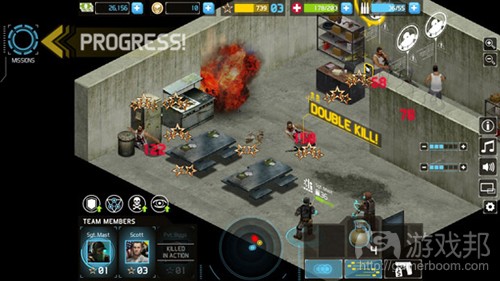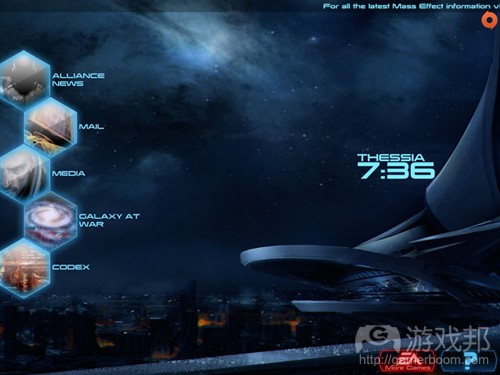主流发行商谈跨平台游戏发展趋势及前景
作者:Kyle Hilliard
以前,游戏就是一种单一体验。把游戏插入主机,操纵手柄,你就可以在电视机前完成整个游戏。如今,随着娱乐方式在多种平台的开放,主流发行商看到了他们的经营优势。他们想让你处处都可以玩游戏。慢慢地,这些经历被运用在各种各样的社交和手机平台。对玩家而言,这意味着他们可以利用玩Facebook或手机游戏的时间继续推进在家庭游戏机中的进程,升级主角或者解锁新道具。
最近几年,手机及社交游戏爆发出流行趋势,突然间涌现了多种可行平台。Zynga以及Rovio分别《Words with Friends》和《愤怒的小鸟》等游戏而成为了行业里最强大的新兴公司。虽然并非所有传统游戏公司都迅速回应了这一趋势,但确有许多传统发行商开始在这快速崛起的新兴平台上立足。像育碧这类游戏公司不再投入大量的时间和金钱去开发新游戏理念,而是利用《刺客信条》和《幽灵行动》等这类熟知的品牌游戏成功地打入了这一热门市场。
随着2010年《刺客信条:兄弟会》的发行,育碧决定做个试验。在无任何广告赞助和营销推广的情况下,育碧在Facebook上悄悄地发行了《Assassin’s Creed: Project Legacy》。游戏允许玩家通过派遣刺杀任务、收集金币和积累经验值获得《刺客信条:兄弟会》中Ezio的救赎,但是《Project Legacy》只在《兄弟会》的游戏内部文本中进行推广。
育碧电子发行副总裁Chris Early解释道:“那时我们只是为了找到‘Facebook上真的有玩家吗?’这个问题的答案。”此次实验取得了成功,有80%在Facebook体验《Project Legacy》的玩家大部分也玩《刺客信条:兄弟会》。Early将这种特别版本的交叉游戏类型定义为衍生游戏。Early提到:“《Project Legacy》本身就是一款有趣的游戏,我们在考虑,‘如何将同样的游戏体验传送到另一个平台?’因为我们知道我们的粉丝是不会一天24小时都坐在主机前的。如果你没有同时玩这游戏的其他衍生产品或者有此打算的话,你可能不会从衍生游戏中获得多少好处。”
Legacy明确指出《刺客信条》的粉丝会对它的周边产品感兴趣。有了这次成功的支撑,育碧开始探索其它可以吸引狂热粉丝的项目。Early表示:“有些棒球迷给你的印象是,他们观看每一场球赛,工作时收听相关信息。成群结队地到比赛现场,穿着他们喜爱的球队的颜色。这就是狂热粉丝的表现。他们可以做很多事。然而也有些粉丝只是在晚上的时候看看比赛,或者通过报纸来了解一些比赛资讯。”隐藏在衍生游戏背后的理念就是,除了给玩家提供比赛团队,还要给他们提供同种类型的选择,包括虚拟电子游戏世界的一切事物。
尽管这种小型游戏运行于小型平台,但要制作这些不同类型的游戏并让它们之间进行互动则存在一定难度。目前,微软和索尼都限制了游戏在Xbox Live和PSN以外平台的互动,但是它们在此仍有开放趋势。埃德蒙顿和蒙特利尔地区的BioWare总经理Aaryn Flynn解释道:“索尼和微软确实在某些方面对游戏有限制,但是它们知道这是云计算时代,我认为他们最终会有所改变的,因为在这有许多项目是可以实行的。”
Early指出:“由于你确实是在跨越那些不可逾越的游戏系统,所以在技术上存在一定的难度。而且还有‘政策难度’。比如Xbox Live是众人所知的封闭式平台,所以你需采取同微软合作的方式来获得允许。这样你才可以为玩家开发一些游戏。”
为了让这些游戏相互互动,EA和育碧这类公司不得不建造他们自己的外部基础设施。Flynn称:“简单来说,我们采用了我们制作的每款游戏或应用的玩法产生的数据,将它们聚集在一个中心服务器。如此,这些游戏也可以推动其它游戏产生的数据,并以一种有趣且特定的方式来反映这些数据。”
只要这些基础设施设置到位,开发者就会开始寻找新型且有创意的方式来使用这些数据。《使命召唤:精英》应用允许玩家定制《使命召唤:现代战争3》中各式各样的武器以及种族,最近EA透露,《NHL13》将会有一个衍生应用程序,它允许用户之间进行交易、签约自由球员、调整阵容、向其他用户发送信息,以此在新型Connected GM模式中配对。
盈利趋势
当粉丝离开主机时,衍生游戏就可以借原作的力量重新吸引用户,这也是原游戏品牌的全新的盈利渠道。目前许多这类用都是免费的(游戏邦注:比如《使命召唤:精英》),但也有些游戏需要玩家通过购买游戏内货币或经验值来加速游戏升级进程。《质量效应:渗透者》是一款以《质量效应3》为基础的单机iOS游戏,相对于苹果App Store其他高端游戏它的售价较为昂贵。
Early表明:“每一款衍生游戏都是一项单独的业务。我们希望一款游戏可以孕育出另一款游戏,那样的话,感兴趣的粉丝就可以享受多种不同类型的游戏。每一款游戏都有其本身的价值。毕竟我们就是一家盈利性公司,我们发行的每一款游戏,无论是在主机、Facebook还是个人电脑上,它们都是以盈利为目的的。我们希望这些游戏可以获得经济上的收益。”
衍生游戏存在一些潜在的危险。随着AAA电子游戏预算费的增加,发行商在采用先前的零售方式之外,开始寻求任何可以用来销售游戏的方式。一些用户担心,假如被利益冲昏头脑的发行商突然要求用户在购买手机应用的情况下才可以享受游戏原作乐趣,那么以后玩家将无法获得全面的主机游戏体验。《质量效应3》允许在主机上与多位玩家决战、下载免费的Datapad iOS应用、或者付费版《渗透者》iOS游戏建立自己的银河备战系统。这离发行商要求玩家为一个相似的游戏体验而购买单款付费应用还有多远?
推出更次级的手机和社交产品,也可能让发行商面临品牌强度被削弱的风险。例如,EA的免费版《战地3:余震》就是由于大量用户差评,已于3月份从App Store下架。如果这些狂热粉丝下载一款与他们钟爱的品牌相关的应用,而这款衍生游戏无法满足他们的期望,用户可能会觉得受骗,他们不得不再次怀疑以后是否要制定相同的购买决策。
不同的用户群
虽然育碧发现80%的《Project Legacy》玩家也在主机上体验《兄弟会》,但并非每一位发行商都会在他们的主机及社交产品上看到不相上下的游戏使用情况。无论这是由营销策略还是因玩家类型不同所致,Flynn还是看出了其它一些端倪。
虽然《质量效应3》和《龙腾世纪2》都有衍生游戏,但BioWare极少发现主机游戏用户与衍生游戏玩家之间的重叠情况。Flynn解释说:“我还不确定我们是否已具体分析了所有数据,但是我个人认为他们是两个不同的用户群。当然,我们的主机游戏玩家也会涉猎社交游戏,社交游戏玩家也会体验主机游戏。但是考虑到这两种用户群相对大小的不同,我想不会有太多的用户既玩主机游戏又玩社交游戏。”
其它一些公司正尝试让这两种不同类型的用户(包括主机与手机游戏玩家)一起游戏的渠道。《使命召唤》开发者Robert Bowling的另一款游戏《Human Element》及其新工作室Robotoki的出现允许主机游戏玩家与手机游戏玩家相互交换物品。这意味着,在不考虑平台选择的情况下,这两种类型的玩家可以互惠互利。
无论玩家是否玩特定品牌的社交游戏、坚持主机版本或者两者都参与,发行商都已发现大量潜在的用户。Flynn表示:“我想现在的重心不是在平台或设备上,而是将最重要的数据传到云端,这样其它游戏或应用可以同此建立联系。只要这一方法可行,任何新平台都可以得到所需的数据。我个人对Twitter游戏的出现抱有希望。”
我们希望下一代主机游戏可以比它的前代更具有连接性,最近许多发行商和开发商都表示希望交叉平台游戏可以在近几年越发盛行。当问到衍生游戏是否会成为育碧公司其它类型游戏发展的一项策略时,Early答道:“我知道这是必然的。”(本文为游戏邦/gamerboom.com编译,拒绝任何不保留版权的转载,如需转载请联系:游戏邦)
How Cross-Platform Gaming Will Change The Way You Play
by Kyle Hilliard
In previous generations, a game was a singular experience. You put it in a console, played, and completed it in front of your television with a controller in hand. Today, major publishers see their franchises as entertainment packages to be enjoyed across multiple platforms in multiple locations. They want you to take your games everywhere. Increasingly, these experiences are being delivered on a variety of social and mobile platforms. For gamers, this means that your Facebook and mobile gaming time can now be spent leveling up a character or unlocking new items in the game you’re playing on your home console.
Mobile and social gaming platforms have exploded in popularity in recent years, creating suddenly viable platforms. Companies like Zynga and Rovio have become new power players in the publishing world with games like Words with Friends and Angry Birds. While not all have been quick to respond, many traditional game publishers are starting to establish footholds on these quickly growing new platforms. Rather than spending time and money coming up with new ideas, many companies like Ubisoft are leveraging their known brands like Assassin’s Creed and Ghost Recon as a means to break into this popular market.
When Assassin’s Creed: Brotherhood released in 2010, Ubisoft decided to do an experiment. Without the benefit of any advertising or marketing, the company quietly released Assassin’s Creed: Project Legacy on Facebook. The game allowed players to send out assassins on missions and collect money and experience that could be redeemed by Ezio in Assassin’s Creed: Brotherhood, but Project Legacy was only promoted through in-game text in Brotherhood.
“What we were trying to find out at the time is, ‘Are there really gamers on Facebook?’” says Chris Early, vice president of digital publishing for Ubisoft. The experiment proved a success, with a strong overlap of 80 percent of gamers playing Project Legacy on Facebook also playing Assassin’s Creed: Brotherhood. Early defines this new type of cross-platform gaming across singular franchises as companion gaming. “[Project Legacy] by itself is still fun to play,” Early says. “We look at, ‘How do we take that same franchise and deliver it on another platform?’ because we know that our fans aren’t sitting in front of their consoles 24 hours a day. You just don’t have as much of the benefit of companion gaming rewards if you’re not playing other games in the franchise at the same time or planning on it.”
Legacy clearly indicated that Assassin’s Creed fans were interested in interacting with their favorite franchise outside of the console experience. Bolstered by its success, Ubisoft started to explore other options to engage the rabid fans of its properties. “Some guys are all about baseball all the time,” Early says. “They can quote stats to you, they watch every game on TV, they listen to it on the radio at work. They go to games a bunch, and they wear the team’s colors. That’s a very engaged fan. There is a lot for them to do. Then there are those people who maybe only watch the games in the evening on television, or read about the games in the paper.” The idea behind companion gaming is to offer the same sort of choices to gamers, except instead of sports teams, everything revolves around fictional video game universes.
Despite being smaller games on less powerful platforms, there is a degree of difficulty in producing these different types of games and allowing them to interact. Microsoft and Sony both currently restrict the cooperation of games outside of Xbox Live and PSN, but they are opening up to the idea. “In terms of restrictions from Sony and Microsoft, there are some, but they recognize that this is the age of cloud computing and I think they’re evolving to keep up,” says Aaryn Flynn, general manager of BioWare’s Edmonton and Montreal locations. “I certainly hope they do, because there’s a lot that can be done here.”
“It is technically difficult because you are really spanning game systems that weren’t designed to be spanned,” Early says. “It’s also ‘policy difficult.’ Xbox Live, for example, has been known for a long time to be a very close-walled garden, so it takes working with Microsoft to get permission to do the things that we’re looking to do for our players.”
To make these games speak to one another, companies like EA and Ubisoft have to create their own external infrastructures. “In laymen’s terms, we take data generated by the gameplay of each game or app that we create, and aggregate it up to a central server,” Flynn says. “From there, those games are also free to pull down data generated by the others, and reflect that data back in interesting and specific ways.”
Once the infrastructures are in place, developers are starting to find new and creative ways to use this data. The Call of Duty Elite app allows players to customize their assorted loadouts and classes in Call of Duty: Modern Warfare 3, and EA recently revealed that NHL 13 will have a companion app that allows users to make trades, sign free agents, tweak their lineups, and send messages to other users to set up matches in the new Connected GM mode.
Follow the Money
Companion games may allow fans to engage their favorite franchises when they’re away from the consoles, but they are also new revenue streams for pre-established brands. Many of these apps are currently free, such as the Call of Duty Elite app, while others allow players to speed up a leveling process by purchasing in-game currency or experience. Mass Effect: Infiltrator, a standalone iOS game that feeds into Mass Effect 3, is comparably priced to other premium games on Apple’s App Store.
“Each one of the [companion] games are stand-alone businesses if you want to think of it that way,” Early says, “We hope that one seeds another and the interested fan plays a variety of those games. Each one is a business in and of itself. That said, we are a for-profit company and each of the games we write, whether it’s on a console, Facebook, or PC, are designed to be profitable ventures. We are looking for a business return to all those games.”
Therein lies the possible danger of companion gaming. With the increasing budget sizes of today’s triple-A video games, publishers are pursuing any and all means to monetize their brands outside of the initial adoption at the retail level. Some consumers worry that you may no longer have access to the full experience of a console game in the future, especially if a profit-hungry publisher decides consumers need to purchase a mobile app to have access to everything in the base game. Mass Effect 3 allows players to build up their galactic readiness by playing multiplayer on the console, downloading the free Datapad iOS app, or the paid Infiltrator iOS game. How long until publishers require a single paid app for a similar experience?
Publishers also run the risk of diluting their brands with inferior mobile and social products. For instance, EA pulled the free Battlefield 3: Aftershock from the App Store in March due to the amount of negative user feedback. If rabid fans download an app related to their favorite brand and the companion game fails to meet their expectations, it may leave a sour taste in their mouths and make them second-guess making similar purchases in the future.
Different Strokes
While Ubisoft saw an 80 percent overlap of Project Legacy players playing Brotherhood on consoles, not every publisher has found such a symmetry between their console and social offerings. Whether it was a difference in marketing or in the type of gamer who was interested in the games, Flynn saw something else.
Both Mass Effect 3 and Dragon Age 2 have companion games, but BioWare found little to no overlap between the console audience and the companion game audience. “I’m not sure we’ve parsed all of the data yet to be more specific, but personally I think they’re different audiences,” Flynn says. “Sure, we have players on our console games who also play social games, and vice versa. But given the relative sizes of those two audiences I think there isn’t a great deal of overlap.”
Others are experimenting in ways to take these two different audiences, the console gamers and the mobile gamers, and allow them to work together. The upcoming Human Element game from former Call of Duty developer Robert Bowling and his new studio Robotoki allows console gamers to team up with those playing the mobile version to exchange supplies. This means players of both versions will benefit from one another regardless of their platform of choice.
Whether gamers play franchise-specific social games, stick to the console version, or play both simultaneously, publishers see a large audience waiting to be tapped. “I think the big focus will be less on the platform and device, and more about getting that all-important data to the cloud so other games and apps can plug in to it,” Flynn says. “Once that’s there, the data is ready for whatever new platforms evolve. That said, personally I hold out hope for a Twitter game.”
With the next generation of consoles expected to be even more connected than their predecessors, many publishers and developers we’ve spoken with recently expect cross-platform gaming to become more prevalent in the coming years. When asked if companion gaming would be a strategy for other Ubisoft games moving forward, Early says, “I know it will be.”(soruce:gameinformer)









































 闽公网安备35020302001549号
闽公网安备35020302001549号